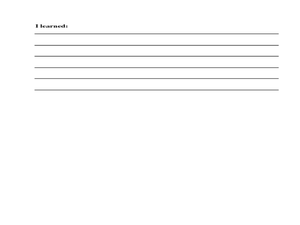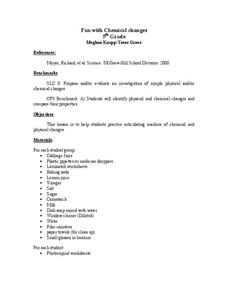Curated OER
Solids, Liquids, and Gases
Students explore the three main forms of matter: solid, liquid, and gas. They examine concrete examples of each, using their five senses and "experimenting" to find differences in them. They find pictures of each, cut them out and past...
Curated OER
Physical and Chemical Changes
Students observe examples of physical changes that can take place between the three states of matter and develop common sense and intuition in distinguishing between chemical and physical changes. They observe diagrams on the board from...
Curated OER
Activity #9 Tye Green Blob
Students comprehend that a chemcial change produce substances with a different composition and physical and chemcial properties. They state the differences between physical and chemical changes. Pupils observe changes that occur during...
Curated OER
Liquid Level
Learners observe liquids in different containers and then explore the concept that liquids have level surfaces. They identify those who are not at the center to reinforce the concept of liquid levels with a representational puzzle and...
Curated OER
11 - The Heat Is On
Students observe physical change of melting by observing substance in original state, melting substance, allowing substance to return to original temperature, determining if substance retained its original properties, and recording results.
Center for Learning in Action
Introduction to the States of Matter
Liquids, gases, and solids are the states of matter in which scholars investigate in a lesson plan that offers in-depth information and engaging activities that look into the three states and the changes their properties make when mixed...
SFPOnline
States of Matter Worksheet
Young scientists get to the heart of the matter as they complete this worksheet on the properties of solids, liquids, and gases.
Beyond Benign
Sublimation
Ah, caffeine! What would some of us do without it? Teach your high school chemistry class the concept of sublimation as they complete a hands-on experiment to visualize the changes caffeine undergoes during heating and cooling....
Curated OER
Solid, Liquid, Gas!
Students determine the properties of the solids, liquids, and gases, and how they can recognize those properties by observing a teacher demonstration. Next, they experiment with at mystery matter that looks like a liquid but that takes...
Curated OER
Solids, Liquids, and Gases
First graders explore the properties of matter. In this states of matter instructional activity, 1st graders conduct scientific investigations that require them to mix, cool, and heat objects in order to observe changes in the properties...
Curated OER
Instructional Lesson Plan: States of Matter and their Properties
Students identify the three states of matter and their properties. In this physical science lesson, students explore a website on the states of matter and complete a worksheet.
Curated OER
Water and Ice: Part 1
Learners observe the state changes in water. In this matter lesson, students observe, measure, and describe water as it changes state. Learners explore how water can change from a solid to a liquid then back again. They journal their...
Curated OER
Density and Mass
Students experiment to find which liquids are more dense. In this density and mass instructional activity, students predict and then test objects to observe and measure their density. students observe which items sink and float....
Curated OER
Putting the Ice in Hockey
Eighth grade physical science classes examine why the ice on which hockey is played is slippery. They do so by discussing phases of matter and the molecular motion in each. They read an article on a website and write out answers to...
Curated OER
Inquiry into Consumer Products
Students recognize different consumer products, found in and around the home, that have reactive or denaturing properties when used together. They explore chemical and physical properties of each product by identifying chemical formulas...
Curated OER
Slime and Intermolecular Attractions
Students explore the strength of intermolecular attractions. They make slime and compare the difference in the physical properties of sheet and powdered polyvinyl alcohol with polyvinyl acetate.
Curated OER
States of Matter and Chemical/Physical Changes Stations
Learners break into four groups, starting at different stations. Each station should take about 10 minutes depending on prior knowledge of the topic. They then rotate when everyone is finished to the next station and discuss answers of...
Curated OER
Matter
In this matter worksheet, students are given 10 sentences with italicized terms that are wrong. Students correct the terms to appropriately fit the sentences. Topics are related to matter such as physical and chemical properties, solids,...
Curated OER
Buoyancy
This is a brief survey of the states and properties of matter directed toward upper elementary physical scientists. Solids and liquids are compared. Density and buoyancy are related. Use this presentation just prior to demonstrating...
Curated OER
Strong Ice
Through three activities, first-time physical scientists wonder at the properties of water. Freeze some soda cans and a container of water prior to the investigation to show that water expands when frozen. Lab groups experiement with...
Curated OER
Insects?
Can you tell the difference between a bug and an insect? Aren't they the exact same thing? Let your learners explore, identify, classify, and document the differences they see in bugs and insects. The activity sheet suggests several...
Curated OER
Chemical Fun
Fifth graders observe and conduct a variety of experiments to differentiate between physical and chemical changes. They mix cabbage juice with different liquids and record their observations on a chart. Students write down their...
Curated OER
Fun With Chemical Changes
Fifth graders observe and identify the differences between chemical and physical changes. In small groups they mix different substances together in glass beakers, and identify which had a chemical change, supporting their statements...
Curated OER
Mixtures of Matter
Young scholars experiment with solids and liquids. In this mixtures of matter instructional activity, students combine matter to form solutions. Young scholars hypothesize, test, and analyze the data to draw conclusions. The...

























